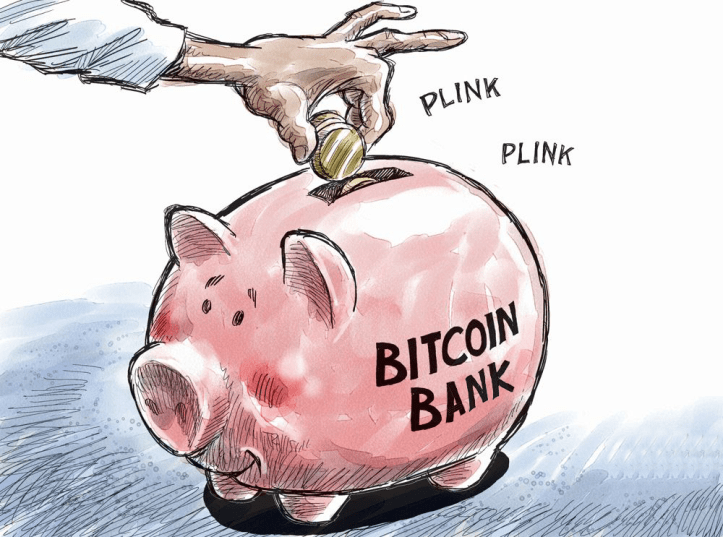Every bank will become a bitcoin bank

For years banks around the world worried that regulating cryptocurrencies would legitimize them and pose a threat to the existing financial system. So they tried to kill bitcoin calling it a fraud, a Ponzi scheme, a vehicle for money launderers and terrorists to fund their activities. While in September 2017, Jamie Dimon, JPMorgan’s CEO, called “bitcoin a fraud,” JPMorgan recently became the world’s first bank to set up shop in the metaverse, featuring in its lounge a digital image of Dimon 😊 Their efforts to kill bitcoin and crypto failed and now they have no choice but to embrace them. The banking industry is racing to catch up and compete in this new world and profit from it. But why the change of heart? The answer is simple: customers want crypto.
Ilias Louis Hatzis is the founder and CEO at Kryptonio wallet.
I think we’re at a defining moment in the financial system. Today, banks are at the heart of our financial system. Without banks, it would be very difficult to make payments, and difficult to create credit.
But over the last decade, while banks were trying to hold on and protect the status quo, new technological disruptors entered the financial landscape and a revolution occurred. Things like bitcoin and digital currencies, peer-to-peer lending, crowdsourced funding, and a slew of new innovations gained traction while banks were not paying attention.
This is a tough time for banks because now they are forced to step outside their comfort zone.
For centuries, banks worked with governments to control the flow of money, by taking deposits and lending some of that money to other customers.
Banks are classic intermediaries. They sit between people who are making payments. But, bitcoin takes out the intermediary. Bitcoin and cryptocurrencies are protocols that allow a person or entity to make a transaction with one another, without an intermediary.
Now traditional banks are literally sprinting to catch up with all the developments in crypto and are asking regulators to slow down their crypto competitors while lobbying for rules that work in their favor.
According to a report by J.P. Morgan, about 300 banks will allow their customers to buy and sell bitcoin using their mobile apps in the first half of 2022.
Another survey by American Banker shows that 44% of regional and global banks will offer crypto support by the end of the year.
Late last year, Visa announced the launch of a new consulting and advisory service to help its banking clients with cryptocurrencies. Visa is also piloting a suite of application programming interfaces that will allow banks to offer bitcoin services. Mastercard is also helping banks navigate the adoption of digital currencies, from early-stage education, risk assessments, and bank-wide crypto and NFT strategy development to crypto cards and the design of crypto loyalty programs. NYDIG, a subsidiary of $10 billion New York-based asset manager Stone Ridge, has partnered with fintech giant Fidelity National Information Services to enable U.S. banks to offer bitcoin in the coming months. Already, hundreds of banks are enrolled in the program.
At the same time, major banks around the world have made direct and indirect investments in cryptocurrency and blockchain companies. In fact, 13 of the world’s largest banks have invested roughly $3 billion so far in cryptocurrency and blockchain companies. Based on research by Blockdata the most active investors based on the number of investments in crypto and blockchain companies are: Barclays (19), Citigroup (9), Goldman Sachs (8), J.P. Morgan Chase (7) and BNP Paribas (6).
In an annual study for 2021, Cornerstone Advisors found that 60% of crypto owners would use their bank to invest in cryptocurrencies. Another 32% said they might do so and just 4% of current crypto owners said they wouldn’t use their bank to invest in crypto because they wouldn’t switch from the exchange they’re currently using.
Regulatory clarity will pave the way for adoption. President Biden’s recent executive order, regarding the responsible development of digital assets, calls for banks to get more comfortable with cryptocurrencies and meet user demand.
The traditional banking system is on the verge of radical changes, and it’s “do or die.” Banks can actually play a significant role in the crypto industry, but they need to shift from thinking of crypto as a competitor to that of a partner.
Whether they like it or not, banks shouldn’t think of themselves as financial institutions that hold money. The future of banks will be in being holders of trust for customers. The ones that manage this transition will likely have a competitive advantage in the future, otherwise, they will not be around for long.
Subscribe by email to join the other Fintech leaders who read our research daily to stay ahead of the curve. Check out our advisory services (how we pay for this free original research.


